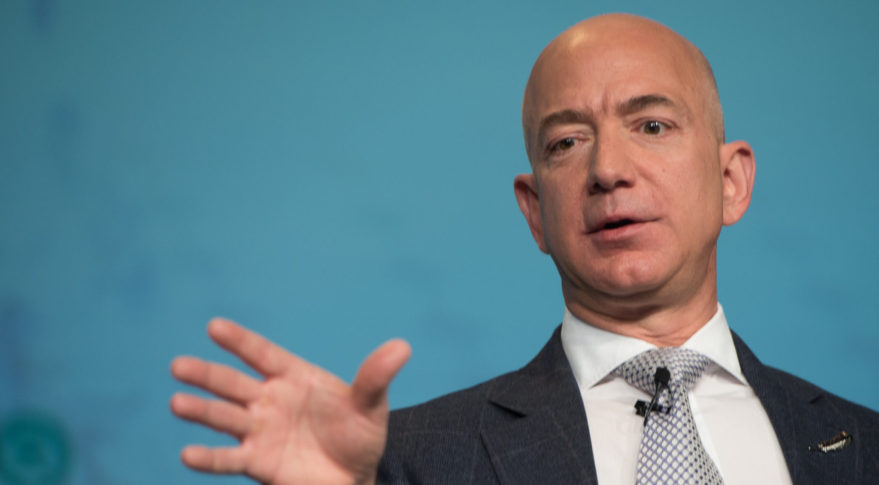Amazon plans to create a satellite constellation of 3236 units to provide access to the Internet.

Internet giant Amazon, founded by Jeff Bezos, who is also the founder of Blue Origin, is interested in obtaining the right to use the frequency band to control thousands of Internet satellites. Photo: Kate Patterson for SpaceNews.
Amazon joins the list of companies planning to create groups of thousands of satellite units for broadband Internet connectivity. The online trading giant has asked international regulators for the right to create a constellation of 3,236 satellites.
Amazon has not disclosed the company that builds its satellites, or their launch date, and the Federal Communications Commission (the Federal Communications Commission (FCC )) has not yet provided market access for this system.
')
An application to create an Amazon group has been filed with the International Telecommunication Union (ITU) under the name “Kuiper Systems” (eng. Kuiper Systems). Amazon confirmed its involvement in the Kuiper project in its statement for SpaceNews.
“The Kuiper project is a new initiative to launch a constellation of low-orbiting satellites that will provide high-speed broadband connectivity with low latency for unattended and unattended corners of the globe.” Amazon says. “This is a long-term project, the prospect of which is to serve tens of millions of people who lack basic access to high-speed Internet. We look forward to building partnerships to implement initiatives with companies that share our goals. ”
The news about the Amazon satellite constellation was originally published by GeekWire.
The grouping involves three levels of satellites - 784 in orbit at 590 kilometers, 1,156 at the 630-kilometer orbit and 1,296 at the 610-kilometer.
Many details about the proposed Amazon constellation remain unknown, such as where the satellites will be built and when Amazon plans to put them into orbit. Amazon has not yet applied to the Federal Communications Commission (US) for permission to service the US market with satellites. This announcement will include more details of the grouping, including information on how Amazon plans to de-orbit satellites to maintain a safe space environment.
Amazon founder Jeff Bezos (Jeff Bezos) is also the founder of the Blue Origin space company, which is developing the reusable rocket New Glenn to launch government and commercial satellites.
The news of the application to ITU at Amazon, arrived on the same day that it became known that Bezos would remain the sole owner of Blue Origin after his divorce. In a statement dated April 4, 2019, McKinsey Bezos said that her husband would retain sole ownership of the company and this would be reflected in the divorce agreement. Bezos will give McKinsey 25% of his stake in Amazon, but he will retain the right to vote. Even after the settlement of the issue, Bezos will remain the richest man on the planet with the remainder of Amazon shares valued at $ 108 billion.
Satellite communication service
Amazon and Lockheed Martin announced the creation of a data exchange service with the AWS Ground Station satellites in order to balance the load on Amazon cloud servers while supporting communication with satellites, especially with low-orbit ones.
Amazon’s proposed grouping according to the application filed with the ITU will circle our planet much closer than other broadband groups that are in the process of development.
OneWeb, for example, aims to orbit 1,200 kilometers with an initial number of satellites of 650 units.
Telesat plans to deploy satellites in orbits of 1, 000 and 1,250 kilometers, although it is not clear how many of the intended 292 satellites will be located in a particular orbit, due to the fact that the target constellation size is 58 satellites more than the FCC allowed for access To the market.
The proposed LeoSat constellation of 108 satellites will operate in an orbit of 1,400 kilometers high.
SpaceX expressed a desire to control most of its future constellation of 4,425 satellites at an altitude of between 1,100 and 1,325 kilometers (although the company requested to sanction 1,584 satellites in a lower 550-kilometer orbit).
Many applications for allocation of the frequency range never go beyond filling out the original papers. In 2016, Boeing submitted an application to the FCC for a constellation from 1,396 to 2,956 satellites, but last June admitted that the process did not move beyond the plans. The FCC International Bureau told SpaceNews that Boeing withdrew two applications over the past year.
With its implementation, the Amazon system will cost billions of dollars, which is similar to the cost of the SpaceX, OneWeb, Telesat and LeoSat groupings. Bezos said last year that he, at that time, was selling Amazon shares for $ 1 billion to finance Blue Origin.
Source: https://habr.com/ru/post/447112/
All Articles